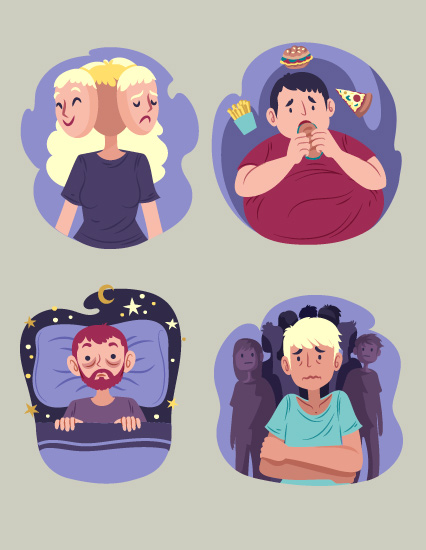Bulimia is an eating disorder which literally means “the hunger of an ox”. Bulimia is one of the eating disorders that is characterized by an uncontrollable urge toward food and a feeling of lack of control over the type and amount of food consumed.
Bulimia, what is it?
This term is frequently confused with vomiting syndrome (Gibson, et al 2022; Nardone, 2014) because in contemporary psychiatric literature, mainly the diagnostic manual used in the field the DSM 5; In our opinion, they wrongly confused bulimia or anorexia nervosa with vomiting syndrome.
Bulimia, a pleasure that poisons
People with this disorder tend to eat disproportionately to what most would consider appropriate. The lives of bulimics usually pass between one binge and another. Their dieting attempts usually lead to massive meltdowns. With this type of disorder, the patient continuously goes from periods of uninterrupted control to periods of devastating binges, the effects of which can be dramatic. In the case of bulimia, patients perpetually follow a diet and fail to maintain it, each time measuring failure and not success, which aggravates their lack of self-esteem, their guilt, their disgust with self, etc.
The most common pattern is that of patients who manage to diet for a few months, "successfully" losing many pounds, only to find themselves inexorably plunged into cycles of binge eating and, in their binge, gaining all the weight back. lost and end up gaining more, more than a few pounds. Much like the mythological character Sisyphus, doomed to eternally pushing a stone up a hill, the bulimic heroically tries, over and over again, to push his rock made of pleasure and control to the top of the hill, eventually see rolling to the bottom. Despite the person's many attempts to control and push this "rock" up the hill, they end up surrendering totally and completely to the temptation of food and this is usually how they get to the top of the hill. clinical obesity.


Book an in-office consultation in Paris Montorgueuil or remotely by videoconference
We receive our patients from Monday to Friday.
To make an appointment you can call us on +33 (0) 1 48 07 40 40
or +33 (0) 6 03 24 81 65 or even make it directly online
by clicking here:
Why should we fear diets?
While the modern world is obsessed with diets, restrictions and control, we have created a perfect storm in which a problem can develop. Without even thinking about the fact that we live in an environment rich in "pleasure foods" or what we might call an obesogenic environment. However, when we diet, we produce 3 dangerous effects that compound our self-failure. Regimes and restrictions give rise to:
The Rebellion Effect - When we diet we begin to take a more rebellious approach to ourselves and life and in our restriction we begin to want to do what "WE" want to do and we rebel so against our own desires and start eating the desired foods,
The transgression effect - when we avoid, abstain and control pleasure, we begin to crave it even more because we have turned what was just a bar or cookie into a guilty desire and therefore more more pleasant, thus ensuring the rapid and immediate collapse of our diet.
The submission effect - this last effect is usually only felt when we have finally tried all of the above and decide we can't do it anymore, so we submit and rather than restrict ourselves, we eat continuously and without any limits, generally creating a situation of obesity.
Diets increase weight
Looking at the work of the prestigious American Psychological Association, we see the results of a longitudinal study that lasted 18 years and followed tens of thousands of people, monitoring the effects of diet or not. What was discovered should come as no surprise to the reader: over 80% of dieters were overweight, while over 70% of non-dieters were normal weight. The inescapable conclusion is that diets make you fat.
The power of obsessive control in an effort to lose weight has a paradoxical effect, essentially leading to a total loss of control, that's for sure. When the rigid and stubborn formula of self-control is applied to food, the potential negative effects are devastating.
Along with bulimia comes a second problem, that of the constant overvaluation of the negative aesthetics of self and the positive aesthetics of others, especially thin people. Their rigid perception loves anything thin and hates anything that isn't, which can lead the patient to seek medical assistance for their "appearance" (cosmetic surgery) rather than their perceptions (psychological). This procedure rarely ends well and, as we know from the many celebrity magazines, it usually fuels an ongoing obsession with surgery and correction, even though satisfaction rates after cosmetic surgery are low.

Treatment of bulimia with brief systemic therapy
Padraic Gibson sheds light on the treatment of bulimia with brief systemic therapy. Padraic Gibson is a family therapist and supervisor. He works in Ireland, Italy and Malta. He is a Senior Research Associate and Lecturer at Dublin City University and Clinical Director of The OCD Clinic®.
Part of the treatment is really surprising for the patients in that we ask them to "eat, and only eat, what they prefer, but only in the three main meals of the day and to eat without any limitation of quantity or quality ". The effect of this intervention is that, almost immediately, it puts an end to binge eating. Indeed, after a few weeks, they begin to decline all prohibited foods, and these even begin to be less desired. At the same time, we help the person to create daily activities (which is also important in these cases) by choosing an activity based on what they like to do the most and not on what seems best for losing weight. We thus arrive at a true style of life, which is not difficult to achieve by the very fact that it is based on the expression of pleasure and not on its repression. This treatment requires only a few months and gives excellent results. As Oscar Wilde said, “ The only way to deal with temptation is to give in to it” .
How the systemic and strategic approach cures bulimia
The systemic and strategic approach is particularly effective in cases of bulimia. Bulimia is one of the psychopathologies addressed in the third year courses of the LACT curriculum .
LACT trainings to treat bulimia with the systemic approach
The treatment of eating disorders by the systemic approach is taught in the third year of the LACT course of the Clinician of the Relationship and in the clinical master of Giorgio Nardone .
Related Resources and Articles
Anorexia - The little mess that keeps order
Bulimia and Binge eating: Introducing the paradoxical diet
Bulimia - Getting a patient to introduce pleasure foods that are prohibited
Eating disorders - Introduction of a food transgression by the entourage?
Eating Disorders - The Vomiting Interval Technique
Eating disorders - The reaction of an anorexic when he gains weight?
Eating Disorders - Is Vomiting OCD?
Getting a patient to introduce pleasure foods that are prohibited



